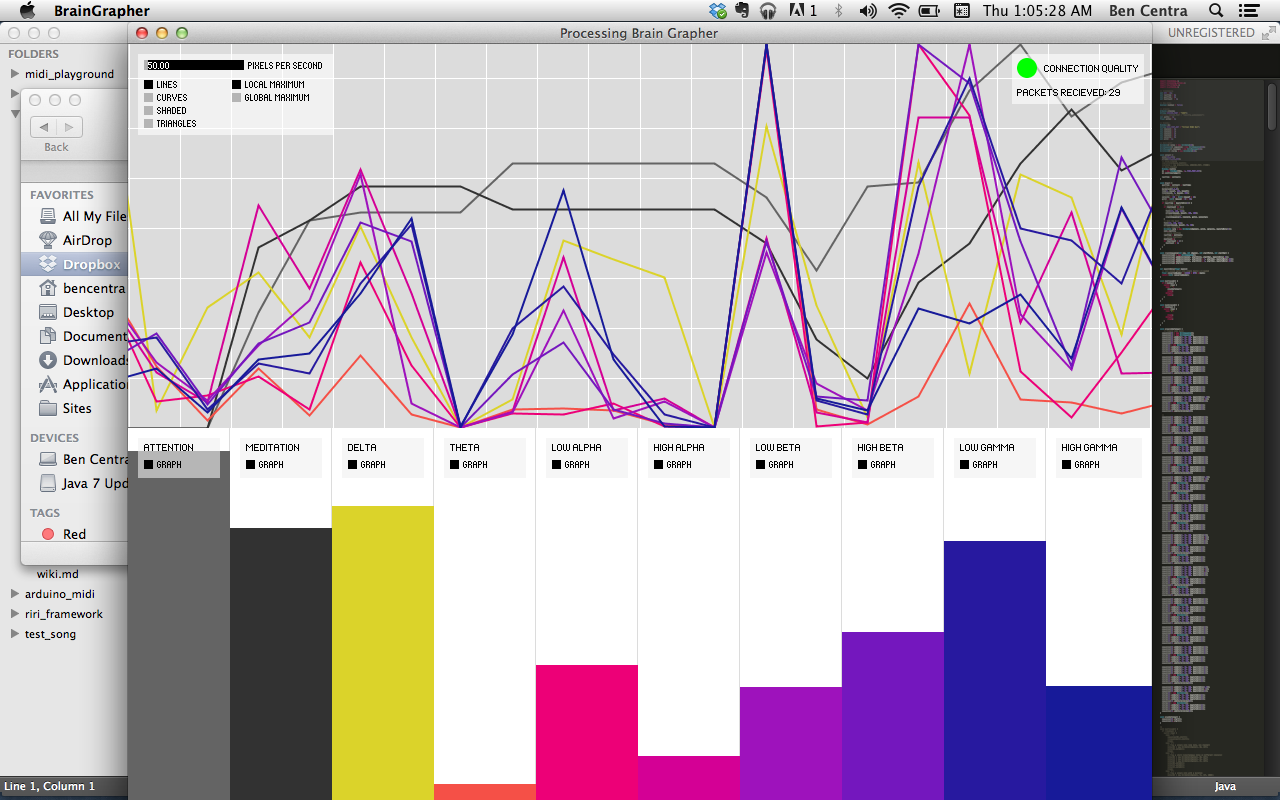Making MIDI Music
in Processing
Ben Centra
@TheBenCentra
blcentra@gmail.com
bencentra.com
BarCamp Rochester - Spring 2014
Why?

- "New Media Team Project," Senior Capstone
- "EEGJ," Interactive audio/visual experience
- DJ with your MIND (and other biosensors)
- Still a work in progress
Why Processing?

- Plenty of contributed libraries
- Easy to learn, easy to use
Why MIDI?

- Focus on the music, worry about sound later
- Swap out instruments easily in software
- Plenty of DAW options (i.e. Ableton Live)
- There's a library for that: TheMidiBus
MIDI Messages
- Up to 4 bytes, usually: status, channel, and 2 data bytes
- Example: Note On/Off
- Status = 128/144 + channel (0 - 15)
- Channel = N/A
- Data1 = pitch (0-127)
- Data2 = velocity (0-127)
- Example: Channel Volume
- Status = 176 (any "channel message" status)
- Channel = channel (0-15)
- Data1 = 7
- Data2 = volume (0-127)
Using TheMidiBus
import themidibus.*
MidiBus mb;
void setup() {
// See available MIDI ins/outs
MidiBus.list();
// MidiBus(PApplet sketch, int input, int output)
mb = new MidiBus(this, -1, 1);
}
void draw() {
// Play a note on channel 0 of pitch 60 (C) and velocity 80
mb.sendNoteOn(0, 60, 127);
delay(500);
// Stop the note
mb.sendNoteOff(0, 60, 127);
delay(500);
}
What I Need
- Notes: A single tone plays for some duration
- Chords: Multiple notes play simultaneously
- Melody: Multiple notes play in sequence
- Need to manipulate Notes, Chords, and Melodies
programmatically, in real time, as MIDI messages
RiriFramework
- Processing library (almost) for making MIDI music
- Several types of objects:
- RiriNote - single note
- RiriChord - simultaneous notes
- RiriSequence - sequential notes
- RiriMessage - general MIDI message
- Uses an instance of TheMidiBus for sending MIDI messages
- Code: https://github.com/codenameriri/riri-framework
RiriObject
- Everything extends RiriObject, contains common properties
- Duration - length of the note/chord
- Repeats - how many times to play the note/chord
- Infinite - repeat forever
- Playing - currently playing
- All RiriObjects are Threads
- Used for timing and duration
- Needs tweaking, but it works well enough for now
RiriNote
- Has a channel, pitch, and velocity
public void run() { while (running && counter < repeats) { // Send a noteOn message noteOn(); // Sleep for the note's duration try { sleep((long) duration); } catch (Exception e) { println("Problem sleeping thread..."); println(e.getMessage()); } // Send a note off event and quit executing noteOff(); if (!infinite) { counter++; } } running = false; counter = 0;}
RiriChord
- Has an ArrayList of RiriNotes, to be played simultaneously
- Duration set to that of the chord's longest RiriNote
public void run() {
while (running && counter < repeats) {
// Play the notes in the chord
for (int i = 0; i < notes.size(); i++) {
notes.get(i).start();
}
// Sleep for the chord's duration
try {
sleep((long) duration);
} catch (Exception e) {
println("Problem sleeping thread...");
println(e.getMessage());
}
// Stop the notes in the chord
counter++;
}
running = false;
counter = 0;
}
RiriSequence
- Has an ArrayList of RiriObjects (notes or chords), played in order
public void run() {
// Loop through each note in the sequence
while(running && counter < repeats) {
int c = 0;
while (c < notes.size()) {
// Grab and play the current note in the sequence
RiriObject currentNote = notes.get(c).clone();
int wait = currentNote.duration() * currentNote.repeats();
currentNote.start();
// Sleep for the duration of the note
try {
//sleep((long) currentNote.duration());
sleep((long) wait);
} catch (Exception e) {
println("Problem sleeping thread...");
println(e.getMessage());
}
c++;
}
if (!infinite) {
counter++;
}
}
// If we're out of notes, stop executing
running = false;
counter = 0;
println("Done");
}Now What?
- Apply some rules to make it sound more "musical"
- Add structure for performing "songs"
- Use sensor data to determine what sounds to play
Music Theory
- Keep things in time, maintain the rhythm
- Helper function: beatsToMils(1);
- Use scales that sound pleasant
- Ex) Pentatonic scale: I, II, III, V, VI
- Use common chord progressions
- Ex) Basic Song: I - IV - V - I
- Don't forget dynamics!
- Adjust the velocity of notes in a natural way
Song Structure
- Determine the time signature
- Beats per measure = 4
- Determine the length of each section
- Measures per "phase" = 8
- Determine the number of sections per song
- Phases = 4
- Adjust chords and scales based on position within the song
Data => Music
- Average data from 8 brain waves, map values
- -100 = Max "Relax"
- 0 = "Neutral"
- 100 = Max "Focus"
- Store last X values, use average to set global level
- Use absolute value of level (0 - 100) to determine "grain"
- Higher grain = more musical activity
- Other sensors:
- Pulse sensor = Tempo of the song
- Pressure sensors = Musical flourishes, Live effects
Brain Data!

Sample 1
- Song #1 - Dynamic melody, constant interval
- Song #2 - Dynamic melody, dynamic interval
- Song #3 - Repeated notes and motifs
- Song #4 - Tempo shifting
- Code: https://github.com/codenameriri/test-song
Sample 2
- Music generated using (fake) brain data
- "Neutral" = a bit of everything, low intensity
- "Relax" = arpeggiator and synth pad
- "Focus" = drums and bass
- Code: https://github.com/codenameriri/test-music
Going Forward
- Officially package RiriFramework as a Processing Library
- Finish EEGJ for Imagine RIT in 2 weeks

Thanks for Coming!
Ben Centra
@TheBenCentra
blcentra@gmail.com
bencentra.com
Making MIDI Music with Processing
By Ben Centra
Making MIDI Music with Processing
An overview of my "RiriFramework" for creating MIDI music in Processing. Maybe some details about EEGJ, using Arduino-powered sensors to get our data, etc.
- 2,621

